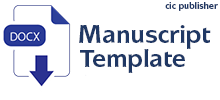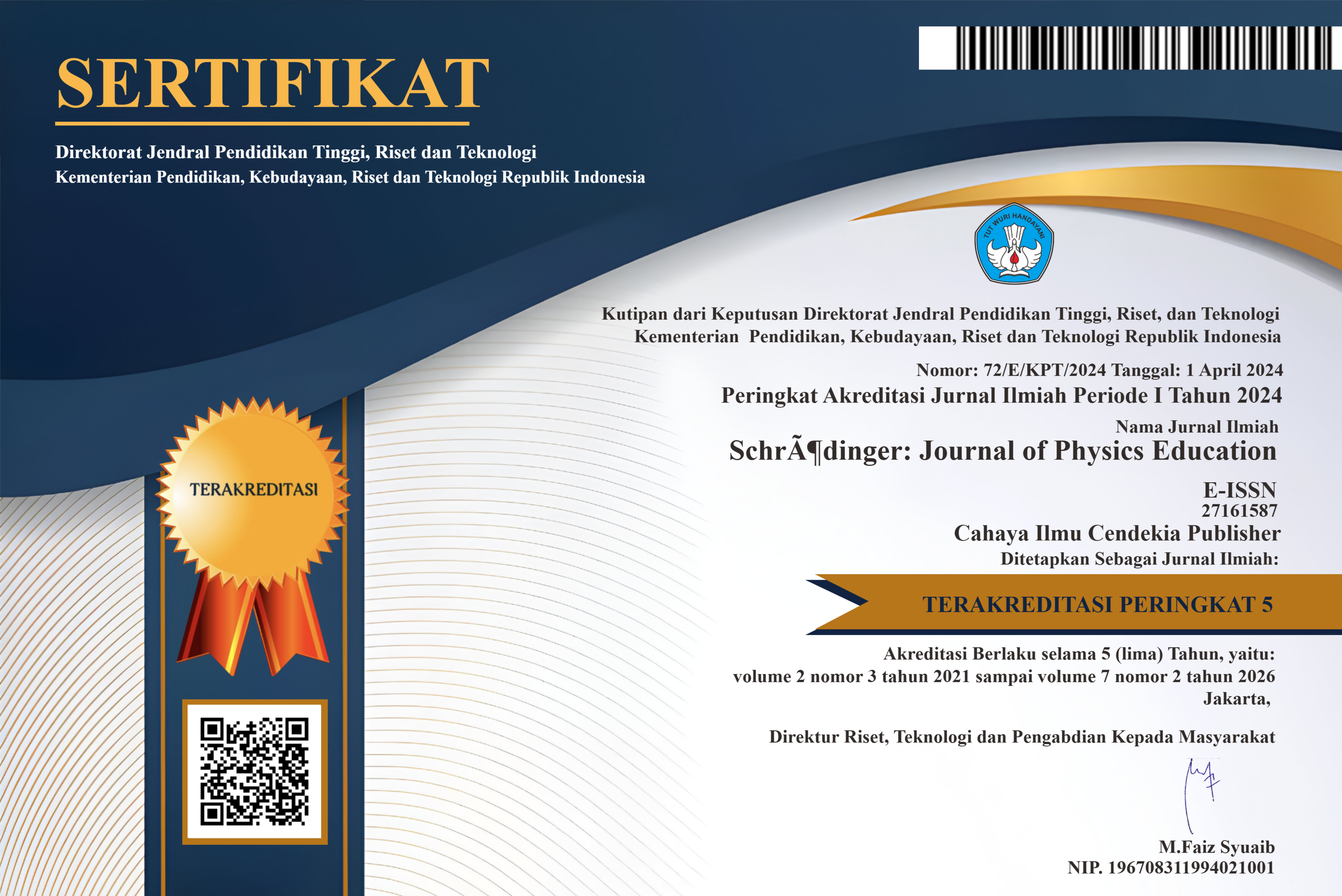Increasing Students' Cognitive Absorption Through Remedial Learning in Physics
Abstract
Purpose of the study: To determine whether there is an increase in junior high school students' absorption of physics subjects after participating in remedial learning.
Methodology: This type of research is classroom action research. Junior high school students as subjects subjected to action in this study. The sampling technique in this study used purposive sampling. The instruments used in this study were diagnostic tests, final tests, observation guidelines. The collected data were analyzed using quantitative analysis.
Main Findings: The application of remedial learning has been able to help students increase their cognitive absorption from one cycle to the next.
Novelty/Originality of this study: The novelty of this research is that teachers can find out one of the learning methods to increase students' absorption and add insight into learning strategies.
References
F. I. Putri, “Perbandingan Hasil Belajar Siswi Kelas VII C Dan VII D terhadap Mata Pelajaran IPA Fisika,” Qalam J. Ilmu Kependidikan, vol. 10, no. 1, pp. 38–47, 2021, doi: 10.33506/jq.v.
Mulyati, F. I. Putri, and Deswalman, “Efforts to Improve Student Activities and Outcomes in Physics Learning Using the Two Stay Two Stray Technical Cooperative Learning Model at Senior High School,” Integr. Sci. Educ. J., vol. 4, no. 1, pp. 30–35, 2023, doi: 10.37251/isej.v4i1.294.
N. Nursyamsiah, “Minat Belajar dan Kemandirian Belajar Siswa terhadap Kreativitas Belajar Sejarah Siswa Kelas X IPS MAN 1 Kabupaten Sarolangun,” Indones. J. Educ. Res., vol. 3, no. 3, pp. 57–61, 2022, doi: 10.37251/ijoer.v3i3.562.
E. R. Ramil, “Analisis Lingkungan Belajar Siswa Mata Pelajaran Fisika di Sekolah Menengah Atas Negeri 10 Kota Jambi,” Schrödinger J. Phys. Educ., vol. 1, no. 1, pp. 7–12, 2020, [Online]. Available: https://cahaya-ic.com/index.php/SJPE/article/download/24/15.
Kamid, D. A. Kurniawan, R. Perdana, B. Widodi, E. Triani, and P. Fadillah, “The Persistence Character and Math Processing Skills of Elementary School Students in Thematic Learning,” J. Ilm. Sekol. Dasar, vol. 7, no. 2, pp. 363–373, 2023.
D. Prambanan, Dila Yathasya, and P. S. A. Anwar, “Analysis of Cognitive Learning Outcomes of Compliance Personality Students in Solving Mathematical Problems,” J. Eval. Educ., vol. 4, no. 1, pp. 31–35, 2023, doi: 10.37251/jee.v4i1.285.
B. Widodi, Darmaji, and Astalini, “Identifikasi Keterampilan Proses Sains Dan Kemampuan Berpikir Kreatif Siswa,” J. Pendidik. dan Pembelajaran IPA Indones., vol. 13, no. 1, pp. 1–8, 2023, doi: 10.23887/jppii.v13i1.57131.
Hamdanah and M. M. Said, “Implementasi Pendekatan Remedial untuk Pengentasan Masalah Belajar,” Indones. J. Educ. Sci., vol. 3, no. 1, pp. 24–48, 2020, doi: 10.31605/ijes.v3i1.911.
S. U. S. Supardi, L. Leonard, H. Suhendri, and R. Rismurdiyati, “Pengaruh Media Pembelajaran dan Minat Belajar Terhadap Hasil Belajar Fisika,” Form. J. Ilm. Pendidik. MIPA, vol. 2, no. 1, pp. 71–81, 2015, doi: 10.30998/formatif.v2i1.86.
A. Moriyike LALEYE, “Effects Of A Computer-Programmed Instructional Strategy On Basic Science Students’ Learning Outcome In Two Instructional Settings In Ondo State, Nigeria,” Int. J. Sci. Res. Manag., vol. 7, no. 2, pp. 869–876, 2019, doi: 10.18535/ijsrm/v7i2.el01.
M. Ilham and M. Gusrita, “Korelasi Sikap Siswa Kelas XI terhadap Hasil Belajar Fisika,” Schrödinger J. Phys. Educ., vol. 3, no. 2, pp. 43–46, 2023, doi: 10.37251/sjpe.v3i2.498.
S. N. Mitra and K. Nurachadijat, “Kontribusi Kompetensi Pedagogik Guru Terhadap Motivasi Belajar Siswa,” J. ILMU Pendidik., vol. 3, no. 1, pp. 31–42, 2023.
T. Hasibuan, “Upaya Meningkatkan Hasil Belajar Fisika Melalui Pendekatan Konstruktivis Pokok Bahasan Fluida Statis Pada Siswa Kelas Xi Mia-3 Sma Negeri 3 Sibolga Tahun Pelajaran 2019-2020,” J. ESTUPRO, vol. 4, no. 3, pp. 61–69, 2019.
A. . S. D. Indrayanthi, “Penerapan Metode Eksperimen Sebagai Upaya Meningkatkan Prestasi Belajar Fisika Pada Materi Pengukuran Peserta Didik Kelas X.7 Semester I Sma Negeri 1 Gianyar Tahun Pelajaran 2022/2023,” Widyalaya J. Ilmu Pendidik., vol. 3, no. 3, pp. 373–380, 2023.
I. K. Darta, “Upaya meningkatkan hasil belajar fisika melalui model pembelajaran berbasis masalah (problem based learning) pada siswa kelas XI IPA SMA Negeri 1 Marga,” Indones. J. Educ. Dev., vol. 1, no. 2, pp. 229–239, 2020, doi: 10.5281/zenodo.4003999.
S. Megawati, “Penerapan Model Discovery Learning Dalam Meningkatkan Hasil Belajar Mata Pelajaran Biologi,” NOSARARA J. Pendidik. DAN ILMU Sos., vol. 10, no. 2, pp. 139–146, 2022.
I. G. A. P. Sriwati, “Penerapan Model Pembelajaran Problem Based Learning Untuk Meningkatkan Hasil Belajar Matematika Siswa,” Indones. J. Educ. Dev., vol. 2, no. 2, pp. 302–313, 2021, doi: 10.55215/pedagogia.v14i1.4787.
N. Aenon, I. Iskandar, and H. S. Rejeki, “Faktor Faktor Yang Mempengaruhi Rendahnya Prestasi Belajar Pendidikan Jasmani,” J. Ilmu Keolahragaan, vol. 3, no. 2, p. 149, 2020, doi: 10.26418/jilo.v3i2.42965.
T. Waruwu, “Identifikasi Kesulitan Belajar pada Pembelajaran IPA dan Pelaksanaan Pembelajaran Remedial,” J. Educ. Dev. Inst. Pendidik. Tapanuli Selatan, vol. 8, no. 2, pp. 285–289, 2020.
N. L. Widiani, “Penerapan Model Pembelajaran Kooperatif Tipe Pair Check untuk Meningkatkan Hasil Belajar Matematika,” J. Educ. Action Res., vol. 5, no. 2, pp. 278–284, 2021, doi: 10.23887/jear.v5i4.40036.
A. Ianah, R. Latifa, R. Kolopaking, and M. N. Suprayogi, “Kesejahteraan Siswa: Faktor Pendukung dan Penghambatnya,” Bus. Econ. Commun. Soc. Sci. J., vol. 3, no. 1, pp. 43–49, 2021, doi: 10.21512/becossjournal.v3i1.7028.
F. N. Utami, “Peran Guru dalam Mengatasi Kesulitan Belajar Siswa Sekolah Dasar,” Edukatif J. Ilmu Pendidik., vol. 2, no. 1, pp. 93–101, 2020, doi: 10.31004/edukatif.v2i1.91.
F. C. Dirna, “Pengaruh Suasana Lingkungan Sekolah terhadap Peningkatan Motivasi Belajar Siswa di SLB Negeri Banyuasin,” Salus Cult. J. PembangunanManusia dan Kebud., vol. 2, no. 1, pp. 26–35, 2022.
S. A. Ilyas, M. Y. Wahab, and S. F. Saleh, “Pengaruh Bimbingan Belajar Terhadap Kesulitan Belajar Matematika Pada Murid Kelas Iv Sd Inpres Bertingkat Butung Kecamatan Wajo Kota Makassar,” SIGMA (Suara Intelekt. Gaya Mat., vol. 12, no. 1, pp. 60–70, 2020.
A. D. Rahmawati, R. A. Putri, and J. Setiyono, “Penerapan Tes Formatif sebagai Alat Evaluasi Pembelajaran yang Efektif,” in Prosiding Seminar Nasional Daring Unit Kegiatan Mahasiswa Jurnalistik (Sinergi) IKIP PGRI Bojonegoro, 2023, pp. 657–663.
Suwarto, “Karakteristik Tes Ilmu Pengetahuan Alam,” J. Pendidik., vol. 31, no. 1, pp. 109–120, 2022, doi: 10.32585/jp.v31i1.2269.
Z. Zakiyah, “Karakteristik Tes Prestasi Bahasa Inggris sebelum Covid-19,” J. Pendidik., vol. 31, no. 1, pp. 131–148, 2022, doi: 10.32585/jp.v31i1.2226.
M. M. Wardi and M. Hidayatullah, “Implementasi Model Pembelajaran Two Stay-Two Stray (Ts- Ts) Untuk Meningkatkan Prestasi Belajar Siswa,” Ibtida’iy J. Prodi PGMI, vol. 6, no. 2, pp. 19–30, 2021.
P. Selvarajan and T. Vasanthagumar, “Competencies of Low Achievers,” IJSSIR (International J. Soc. Sci. Interdiscip. Res., vol. 11, no. 01, pp. 283–287, 2022, [Online]. Available: https://gejournal.net/index.php/IJSSIR/article/view/189.
Copyright (c) 2023 Asmawati Asis, Chin Peng Ching, Witsanu Suttiwan

This work is licensed under a Creative Commons Attribution-NonCommercial 4.0 International License.
Authors who publish with this journal agree to the following terms:
- Authors retain copyright and acknowledge that the Schrödinger: Journal of Physics Education is the first publisher licensed under a Creative Commons Attribution 4.0 International License.
- Authors are able to enter into separate, additional contractual arrangements for the non-exclusive distribution of the journal's published version of the work (e.g., post it to an institutional repository or publish it in a book), with an acknowledgment of its initial publication in this journal.
- Authors are permitted and encouraged to post their work online (e.g., in institutional repositories or on their website) prior to and during the submission process, as it can lead to productive exchanges and earlier and greater citation of published work.






.png)
.png)








.png)
.png)
.png)







